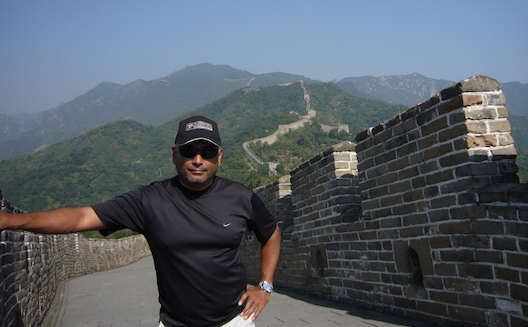What I know about angel investing: Ed Roberto


Ed Roberto at the Great Wall of China. (Image via
Techstars)
With more than 30 years of experience as a startup founder, cofounder, angel investor and mentor, Ed Roberto is pretty well placed as the VP of the Techstars Accelerator programs for the Middle East and Africa.
As he embarks on his new role in the region Wamda chatted with Roberto to find out what he can share about the still nascent practice of angel investing.
Even angel investors make mistakes. My sense, in speaking to high net worth individuals, is they are uncomfortable with high risk intellectual property investments. Lacking any asset base, software companies are just too risky for their investment thesis. This hurts the ability of young tech startups to get off the ground.
Experience helps. I’ve been the cofounder of 15 companies, two of which have gone public and been pretty spectacular failures. I’ve been two types of entrepreneur. I started my first company when I was in college, at 22. It was a software company that did training. I eventually sold that. I have also been a turnaround executive where I have typically been brought in by boards of directors or investors who have concerns about their investments.
You need confidence but you also need humility. When it comes to your business idea, the people you work with, sometimes you have to listen to advice that you might not necessarily want to hear but is important to hear. Being able to take a hard look at the idea you germinated and realizing that it is time to pivot… that balance is very elusive, but it’s important to have and not lose sight of because the challenges a startup brings in life can only be described as an unending series of change, so you have to be very adaptable, incredibly resilient and confident but you also have to operate with a degree of humility to get you through those very difficult periods and they will be there.
You need to believe in your investment. Believe in the entrepreneur, make an investment, actively help the business succeed with good advice to the entrepreneur and introductions to potential partners and customers. Be Socratic in how you provide your views and let the entrepreneur figure out the solution to their challenge. I enjoy seeing a company develop from an idea and blossom into a successful business that delights its customers.
Angel investment isn't as apparent in the region. Nor as plentiful as it is in the US or Western Europe. However, the startup scene in the Middle East-Africa region is very vibrant. I’m stunned at the number of entrepreneurs I’ve met in the region who are very excited about what they're doing. Ideas again are localized, but I‘m running into a few now that are thinking globally and how they can take their tech out to the world market.
You have to treat the markets the same. As an angel, whether you’re in the developed market or here in the Middle East, I think you have to come in doing your due diligence regardless. You have to go deeper in emerging markets because some things are done differently. Like the cap table, some people absolutely don’t have a good grasp on what their companies are worth before they take an investment. I think angel investment for parts of the world that aren’t familiar with it don’t exactly happen in a way that’s rational for the entrepreneur.
The numbers in the region will be smaller. When I think about putting money into an emerging market startup I have to be comfortable with the fact the numbers are going to be smaller because the companies are smaller. Entrepreneurs in this part of the world do a whole lot more with a whole lot less. Because it’s so difficult to find angel money to begin with, they actually try to grow towards profitability sooner which is a nice thing, but it’s coming at the sacrifice of growth. If I put in X can I get 10 X in five years or so? I also have to be comfortable as an angel that the number is so small relative to what that company might need in the future that I may not get that money back and I have to embrace that thought, otherwise I may never make an investment.
Sometimes, events don't work out as we'd like or expect. It happens to both entrepreneurs and investors. Insufficient funds invested into the business, uninspiring traction in a product or market fit won't justify another round, or product iteration not happening fast enough. Being able to make hard decisions is part of being an entrepreneur or an investor. You won't know whether you've made a correct or incorrect decision until some time after you've adopted and acted on a choice.
Pretty much anything mobile is popular. When it comes to trending sectors right now I’d have to say it’s financial services, mobile health and education. Those three stand out for me. In fact, anything on mobile is getting quite popular out here and that makes sense given the proliferation of smartphones and tablets.
It’s important to remember things can change. In my home office I keep all the stock certificates from my failed investments. It reminds me that things can and do change, and not always as planned. They remind me of the circumstances that lead up to the loss and what could have been done differently, if any.
Entrepreneurs are the hipsters right now. They have gotten very popular, it’s certainly become quite popular, almost has a cultishness about it. It’s cool and hip to call yourself an entrepreneur and I don’t necessarily think that’s a bad thing. Something else will come along to substitute that, I don’t know what but right now it’s tech entrepreneurs.


